Donald Trump stops in Pennsylvania before heading to Wisconsin. Hillary Clinton is in Florida.
- Trump ally uses vulgar term to describe Clinton, then apologizes.
- KKK newspaper indicates support for Trump, campaign denounces it
- The FBI speeds up its new investigation into possible Hillary Clinton-related emails.
- Meanwhile, Clinton is set to jump back on the air with television ads in Colorado and Virginia.
- Trump used a “legally dubious” accounting maneuver to avoid reporting hundreds of millions of dollars in income, according to a New York Times report.
- House Speaker Paul D. Ryan says he voted for Trump. Ohio Gov. John Kasich says he did not.
- Share via
Royal Jordanian airlines encourages people to travel to the U.S. ‘while you’re still allowed to’
- Share via
Donald Trump’s campaign denounces support from KKK newspaper
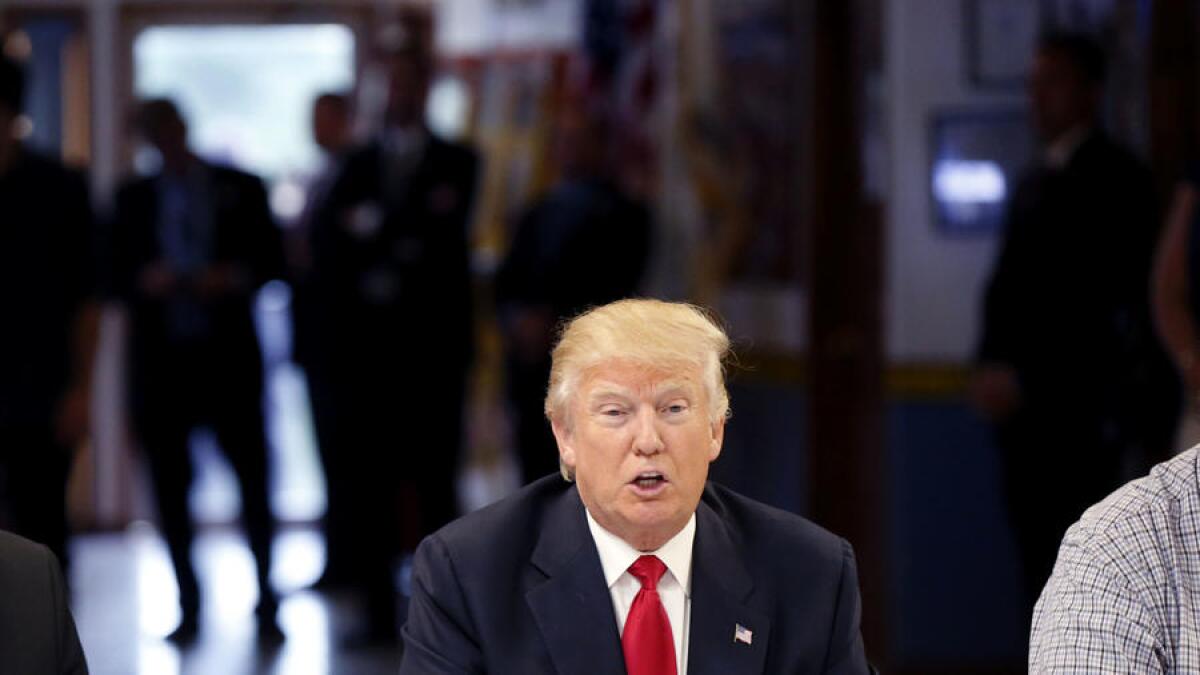
Donald Trump’s campaign Tuesday night said that he “denounces hate in any form” and disavowed support for his candidacy offered by a newspaper associated with the Ku Klux Klan.
The campaign’s statement came hours after the Crusader devoted its front page to Trump’s well-known campaign slogan.
“ ‘Make America Great Again!’ It is a slogan that has been repeatedly used by Donald Trump in his campaign for the presidency,” wrote Thomas Robb, the paper’s editor. “You can see it on the shirts, buttons, posters and ball caps. … But can it happen? Can America really be great again? This is what we will soon find out!”
In an interview with the Washington Post, Robb said that his paper was not officially endorsing Trump.
“Overall, we do like his nationalist views and his words about shutting down the border to illegal aliens. It’s not an endorsement because, like anybody, there’s things you disagree with,” Robb told the Post. “But he kind of reflects what’s happening throughout the world. There seems to be a surge of nationalism worldwide as nationals reclaim their borders.”
Trump’s campaign sought to distance the newspaper’s views from the nominee and his supporters.
“This publication is repulsive and their views do not represent the tens of millions of Americans who are uniting behind our campaign,” Trump’s campaign said in a statement.
The back-and-forth marked his campaign’s latest brush with individuals or groups tied to racist remarks and beliefs.
Trump’s yearlong campaign has been marked by divisive and racially coded rhetoric. He has received support from white supremacist groups and former KKK leaders, including David Duke, who is running for Senate in Louisiana.
On Monday, a white nationalist leader who has funded several ads supporting Trump unveiled a new robocall in Utah targeting write-in candidate Evan McMullin. Trump’s campaign denounced the ads.
Over the weekend, at rally in Phoenix, a Trump supporter was captured on video shouting “Jew-S-A” at reporters.
Kellyanne Conway, Trump’s campaign manger, denounced the rhetoric as “disgusting.”
- Share via
Hillary Clinton after dark in Florida: ‘I could be here all night!’
Hillary Clinton ran a bit late during what was one of her longest days on the campaign trail in months. She took the stage here well after 10 p.m., but fed off the energy of a crowd of more than 4,000, the largest of her three stops Tuesday.
“This is so much fun. But it’s really late. I could be here all night,” she exclaimed in a speech in which she frequently seemed to veer off prepared remarks.
There were some protesters in the audience and Clinton responded to one more directly than she has tended to in the past.
“I’m sick and tired of the negative, dark, divisive, dangerous vision and behavior of people who support Donald Trump,” she said when a man held up a bright green sign that accused her husband of being a rapist — a not uncommon occurrence that has been encouraged by right-wing websites.
Clinton again tore into Trump over what she said was his pattern of mistreating women, and spoke directly to boys, advising them not to follow his example.
“Show respect. Because that shows you’re a real man,” she said.
She closed by urging voters not to let their frustration with the overall presidential campaign be “exploited” by her opponent.
“Anger is not a plan,” she said. “Don’t be used.”
- Share via
Clinton calls Trump the ‘poster boy’ for what’s wrong with U.S. economy
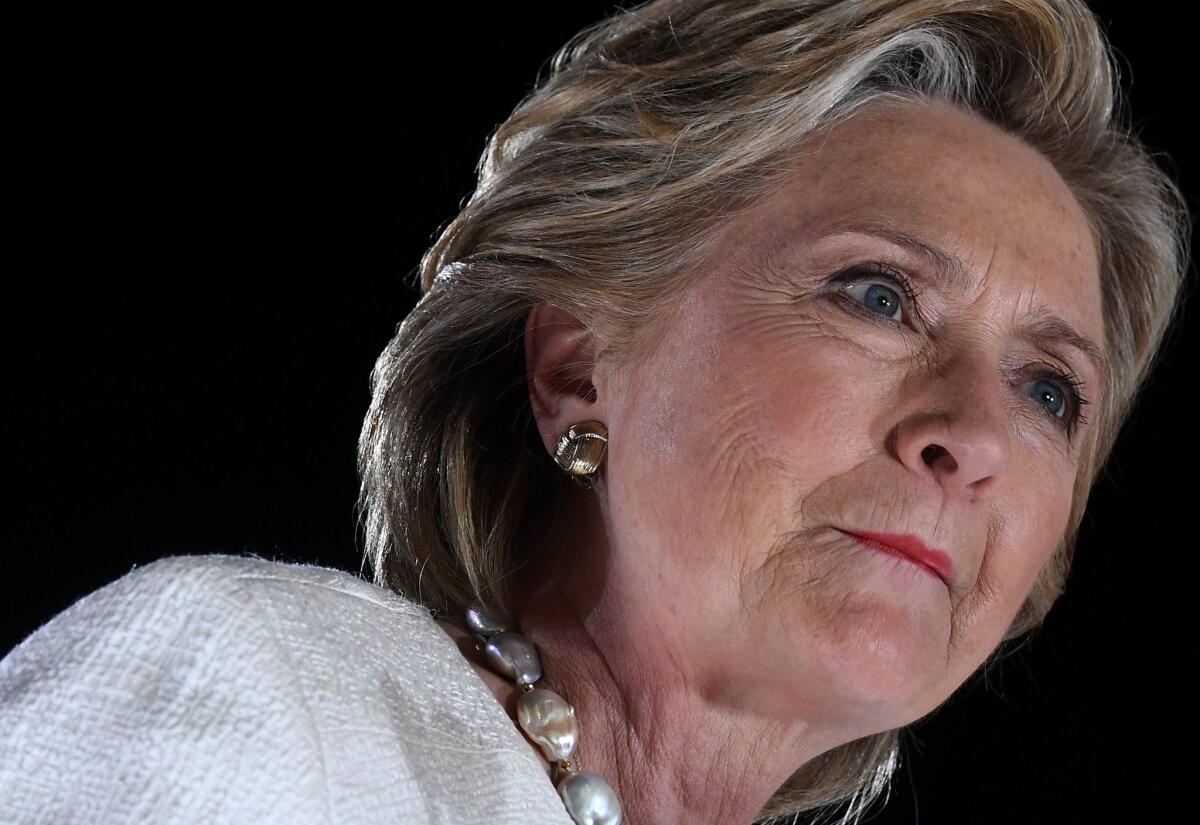
Hillary Clinton seized Tuesday on a new report about steps Donald Trump used to avoid paying federal taxes, calling it part of a pattern of legally questionable behavior.
“Time after time, he’s done things not because he thinks they’re right, not even because he thinks they’re legal,” Clinton said at a rally in Sanford, Fla.
With just a week until the election, Clinton renewed her call, unlikely to be successful, for Trump to release his tax returns.
“The American people deserve to know whether he’s paid any penalty for skirting the law, and how much he’s actually worth, and who he does business with,” she said. “I’m particularly interested in the Russian business deals that he has.”
Clinton, a day after she warned voters that Trump would be a threat to global stability and hours after she cataloged allegations of his mistreatment and disrespect of women, stuck closely to an economic argument. She called Trump “the poster boy for everything that’s wrong with our economy.”
As evidence, she cited reports of how Trump refused to pay small businesses that he had hired as contractors, a fraud lawsuit against him and Trump University, and a Florida real estate development that fell through.
“I see these last days as both the opportunity to continue to tell you what I want to do as president,” she said. “But I also feel it is important to keep drawing the contrast with my opponent, because we’ve never had someone so unqualified and so unfit.”
- Share via
Eight years later, Obama relishes hecklers on the campaign trail
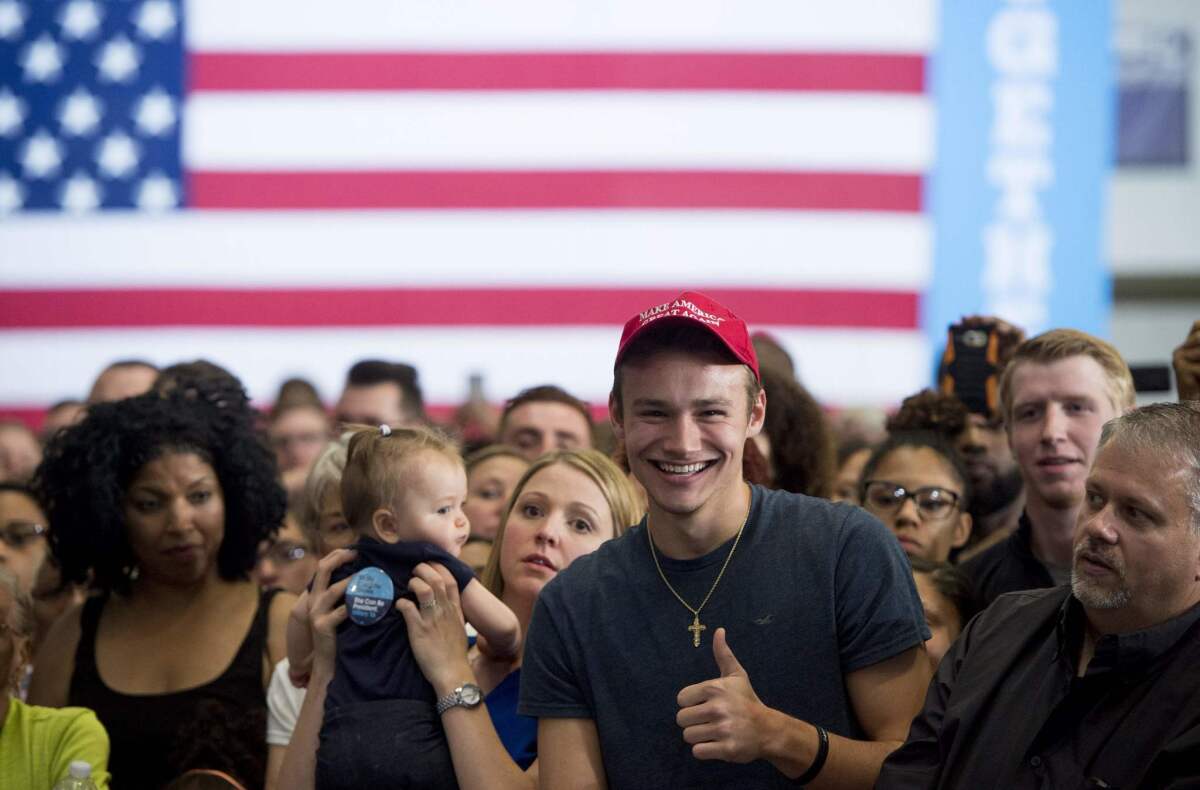
Fortunately for President Obama, a Donald Trump supporter showed up at the Hillary Clinton rally here on Tuesday, providing a foil who ended up electrifying the rally more than disrupting it.
Obama was right in the middle of denouncing Trump’s unfitness to stand as a champion of the working man — “He wouldn’t let you into one of his hotels unless you were cleaning the room!” — when he noticed a “Make America Great Again” hat in the crowd.
“That guy has never worn a baseball hat,” Obama said, “until he started sellin’ em. ... Check where that was made! Because I bet it was made in China!”
“This guy with the hat actually looks like a nice guy — nice smile on his face,” Obama said. “We all know Republican friends or family members who don’t act like Trump.”
“People start talking themselves into thinking, maybe it’s not so bad,” he said. “But it is.”
The crowd howled, and the rally of almost 6,000 ran long — as the president once more relished a moment of the last big campaign swing of his political career.
Eight years after fumbling through his first wave of hecklers in 2008, Obama now actually needs them to freshen up his act.
Tuesday’s event included no other deviations from his stump speech. He said nothing about the new development rocking the presidential campaign, his Department of Justice’s decision to publicly acknowledge the discovery of thousands of emails that could be related to Clinton on a computer owned by former Rep. Anthony Weiner (D-N.Y.), the husband of her close aide, Huma Abedin.
Instead, Obama was gleeful on the campaign trail here, with a swing state crowd that indulged him for more than half an hour of dogma.
He went out on one of his favorite lines: about how he might not be on the ballot, but “progress” and “justice” and “democracy” are. A few new concepts made the ballot in this version.
“Decency” is on the ballot, he said. So is “America.”
The crowd went wild.
- Share via
Trump ally uses vulgar term to describe Clinton, then apologizes
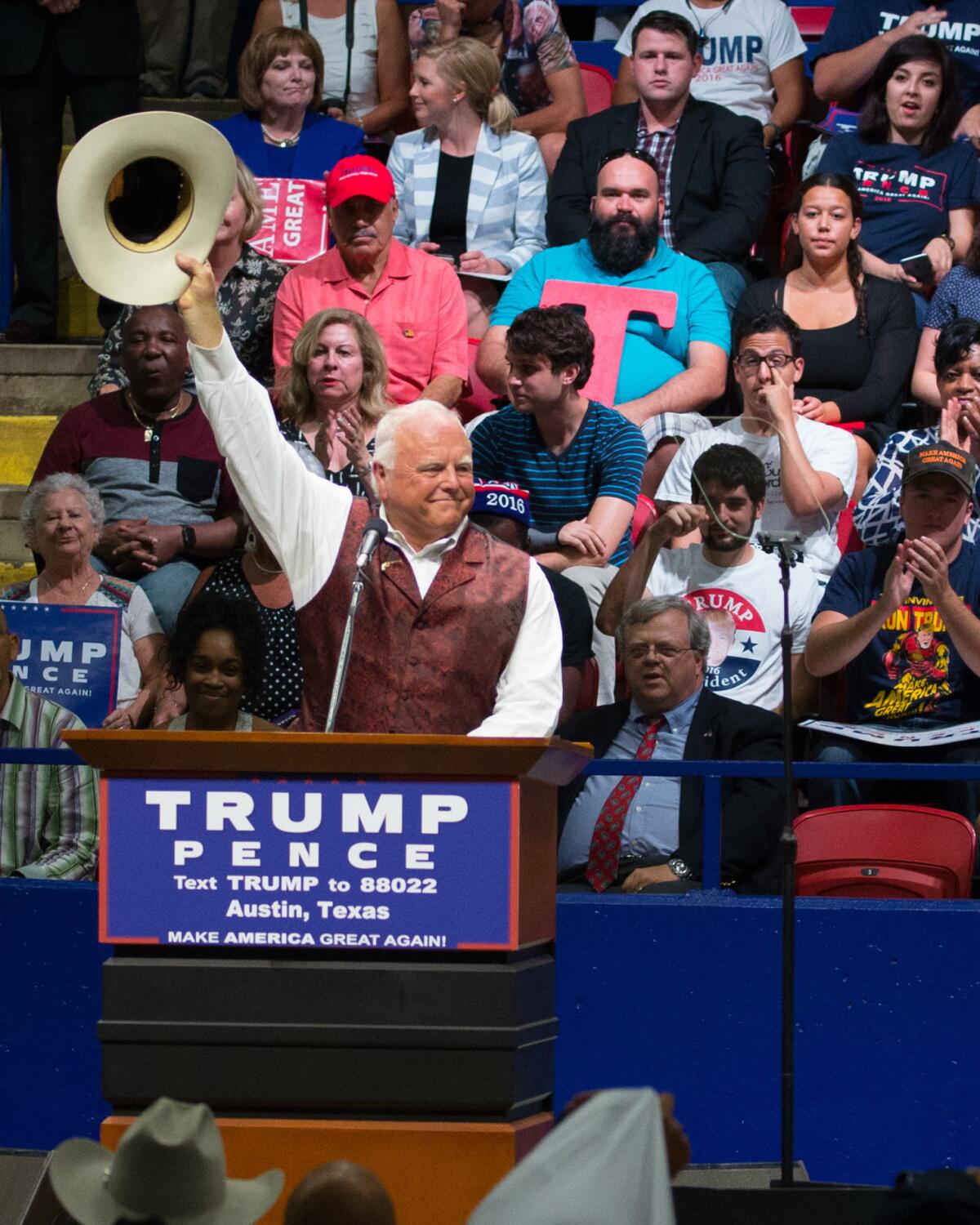
An advisor to Donald Trump appeared to use a vulgar term Tuesday to describe Hillary Clinton and was swiftly condemned by politicians in both parties before apologizing.
The Twitter account of Texas Agriculture Commissioner Sid Miller tweeted the results of a new poll showing Trump leading Clinton by 1 percentage point in Pennsylvania, but instead of using Clinton’s name, the tweet said “c---” and added, “Go Trump Go!”
Miller is a member of Trump’s agricultural advisory committee and a vocal surrogate for the GOP nominee, appearing recently with him at a rally in Las Vegas. His elected post is powerful in Texas; former Gov. Rick Perry served as agriculture commissioner for eight years.
Twitter users quickly excoriated Miller. He deleted the tweet and offered a string of conflicting explanations about how it was sent from his account.
He initially said his account had been hacked, but then his office said his staff had retweeted a tweet without realizing it contained the term, though the tweet was not a retweet.
Miller later told the Texas Tribune that it appeared that one of his staffers had copied and pasted the tweet from another user’s account without noticing the obscenity.
“Commissioner Miller finds the term vulgar and offensive and apologizes to anyone who may have seen it,” his office said.
Texas Democrats condemned Miller.
“Commissioner, you’re an embarrassment to Texas families and our great state,” said state party executive director Crystal K. Perkins. “We wish you had a shred of dignity left. No apology is necessary, we all know it would not be sincere anyways. I’ll pray for you.”
Texas Gov. Greg Abbott, a fellow Republican, called Miller’s tweet “reprehensible.”
“No true Texas gentleman would ever talk this way,” he said.
This is not the first time that the vulgarity has been applied to Clinton by a major Trump supporter. Actor Scott Baio, of “Happy Days” and “Charles in Charge” fame, tweeted a doctored meme showing Clinton standing in front of a sign with the word. He refused to apologize.
- Share via
Clinton renews calls for Trump to release tax returns following report he skirted laws
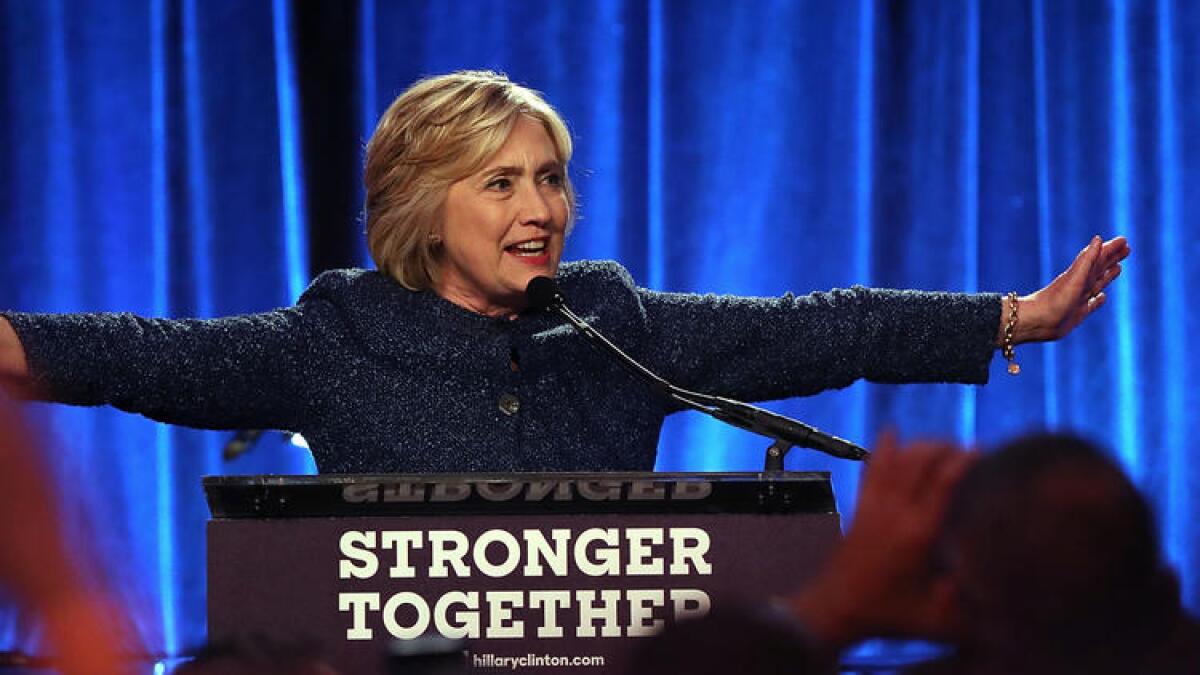
Hillary Clinton’s campaign renewed its calls on Tuesday for Donald Trump to release his tax returns, this on the heels of a report the GOP nominee used an accounting maneuver to avoid reporting hundreds of millions of dollars in income.
“Even though Trump’s own lawyers thought the IRS would likely find the ‘legally dubious’ scheme he used to avoid taxes was against the law, the Trump campaign still refuses to release his tax returns,” said Christina Reynolds, a spokeswoman for Clinton, in a statement.
On Monday, the New York Times reported that in the early 1990s, Trump convinced financial backers to forgive large debts he could not repay, but he avoided having to report the canceled debts as income because he gave the backers equity in his partnerships that owned casinos.
Trump’s attorneys advised him at the time that if he were audited, the Internal Revenue Service would not look favorably upon the tactic, according to the report.
For months now, Trump has eschewed releasing his tax returns, claiming he was under audit by the IRS. However, even while being audited, Trump could still release his returns, experts have said.
Every major party nominee since the 1970s has released tax returns.
- Share via
Clinton details Trump’s faults, tells supporters: ‘We cannot hide from this’
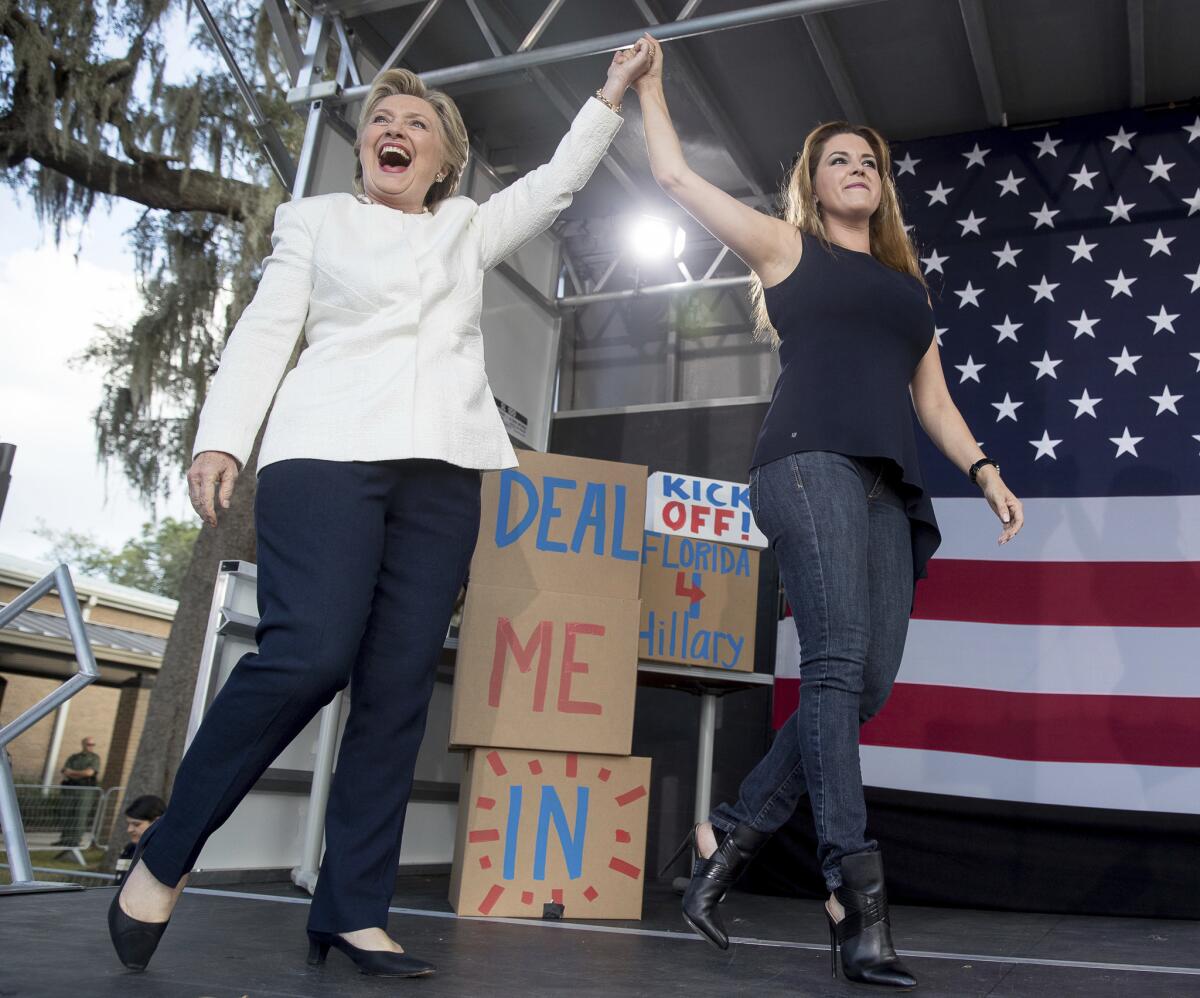
One week before she may be elected the nation’s first female president, Hillary Clinton listed the titles she has amassed in her life: lawyer, first lady, senator and secretary of State, as well as wife, mother and grandmother.
“And, for my entire life, I’ve been a woman!” she declared, to state the obvious.
But her reference to gender was not about the history she could make but for another tough hit against Donald Trump, contrasting her lifetime of public service to his history of “demeaning, degrading, insulting and assaulting women.”
“Some of this stuff is very upsetting. I would frankly rather be here talking about nearly anything else,” Clinton said at an outdoor rally in which she stepped up her attacks on Trump’s character.
“But I can’t just talk about all the good things we want to do, because people are making up their minds,” she added. “This is a consequential choice, so we’ve got to talk about something that frankly is painful. Because it matters.”
Clinton related a now familiar script of how Trump has called women “disgusting” and rate their bodies.
She recalled Alicia Machado, the former Miss Universe, who had introduced Clinton earlier, and how Trump had criticized the pageant winner for gaining weight and then made a spectacle of her efforts to lose a few pounds.
“I mean, really, can we just stop for a minute and reflect on the absurdity of Donald Trump finding fault with Miss Universe?” she said.
In the final week of the campaign, when candidates normally make their closing arguments to voters, Clinton has reverted to raising Trump’s negatives instead of focusing solely on her own positive vision for the nation.
Tuesday was an example of the difficult balancing act she has faced since Friday, when FBI Director James B. Comey sent a shock wave through the race by announcing a renewed investigation into emails that may have come from Clinton’s private server.
She spoke in personal terms about being a mother, and how she had waited each day even as first lady for daughter Chelsea to come home from school so they could talk about the day -- and to make sure her child understood her self worth and had a sense of confidence.
“So when I look at my granddaughter and my grandson I am on the same mission. I want them to know they’re loved, they’re cared for, they’re respected,” she said.
She then pivoted to warn of the example Trump would set for children if he is elected, alluding to his vulgar language in the leaked “Access Hollywood” tape, and even how he bragged about entering the dressing room of a Miss Teen USA pageant as contestants were dressing.
“We cannot hide from this. We’ve got to be willing to face it. This man wants to be president of the United States of America,” she said. “He has shown us who he is. Let us on Tuesday show him who we are.”
Clinton’s rally in Dade City was the first of three on Tuesday in Florida, a swing state where polls show a tight race.
Rather than a Democratic stronghold, where she often campaigns to turn out her base, this event was in Republican-leaning Pasco County north of Tampa, where Mitt Romney defeated President Obama by nearly 7 percentage points in 2012.
- Share via
Republicans tout ground game and early vote in key states as stronger than 2012
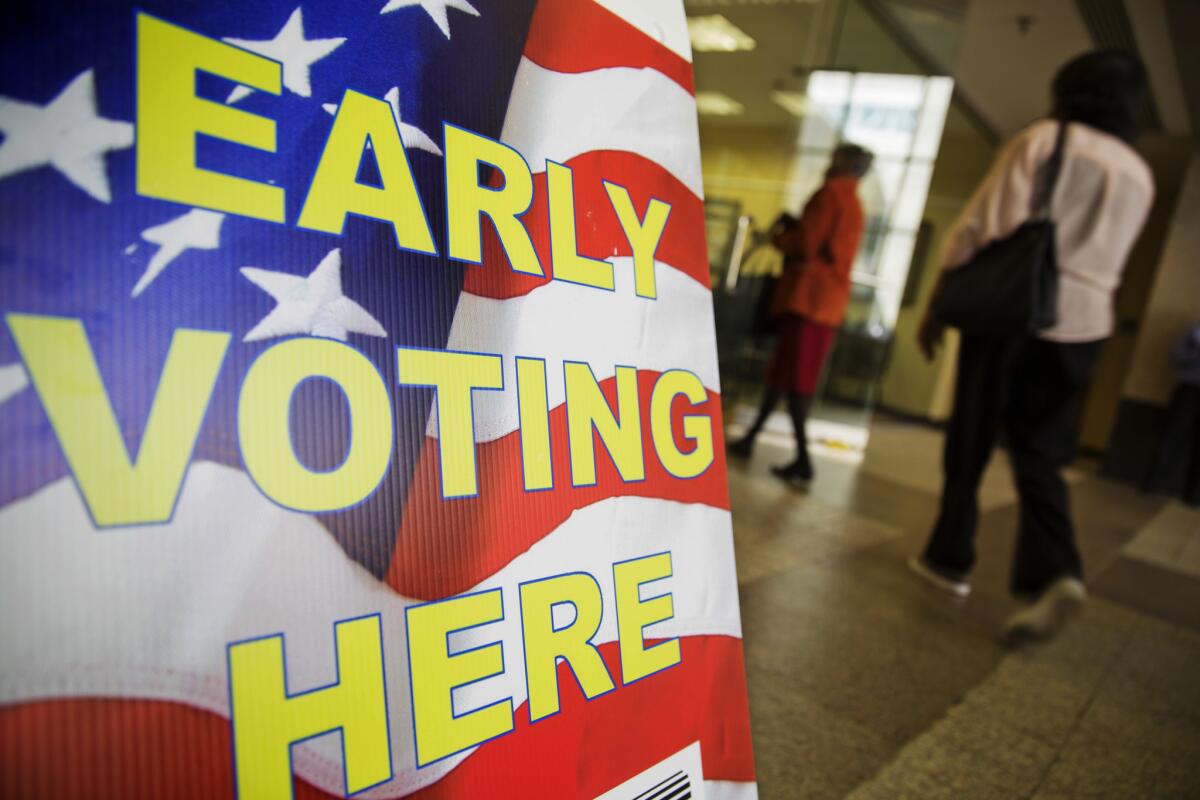
As polls tightened in the presidential race, Donald Trump’s campaign and Republican leaders said Tuesday that their get-out-the-vote operation and early returns are stronger than they were four years ago.
“The Trump campaign is on the offensive and we’re expanding our map, expanding our presence in battleground states and in blue states like Michigan and New Mexico, said David Bossie, Trump’s deputy campaign manager, during a call with reporters.
“Republicans have historically lagged Democrats in early voting, but we usually make up the difference with turnout on election day. This year, we are outperforming Mitt Romney while Democrats are underperforming Barack Obama in crucial battleground states. We’ve been able to cut into their lead big -time.”
Chris Carr, the Republican National Committee’s political director, said their organization in key states began much earlier than in prior elections, and their volunteers had already knocked on more than 13.3 million doors, nearly 2 million more than four years ago.
In early voting and absentee voting, Carr said, Republicans were outpacing their 2012 performance in Arizona, Colorado, Florida, Iowa, Michigan, Montana and North Carolina and in key counties in Georgia, Ohio and Wisconsin.
In some of these states, that didn’t mean that Trump was beating Democratic rival Hillary Clinton in the early vote, but rather that the margin between Republican and Democratic voters was narrower than it was four years ago.
Bossie said Trump’s path to the 270 electoral votes needed to win the White House requires Florida, North Carolina, Ohio and Iowa, Maine’s 2nd district and then one additional battleground state.
“We are closer in some than others but we’re within the margin of error in many and we are fighting for every single vote,” he said, adding that he was heartened by the news that Clinton is advertising in blue states such as Michigan and Colorado.
“She is on the defense. We are on the offense. We’re expanding our map and she’s trying to guard her solid blue states, and we feel very good about that.”
- Share via
Clinton set to go back on the air in Colorado and Virginia
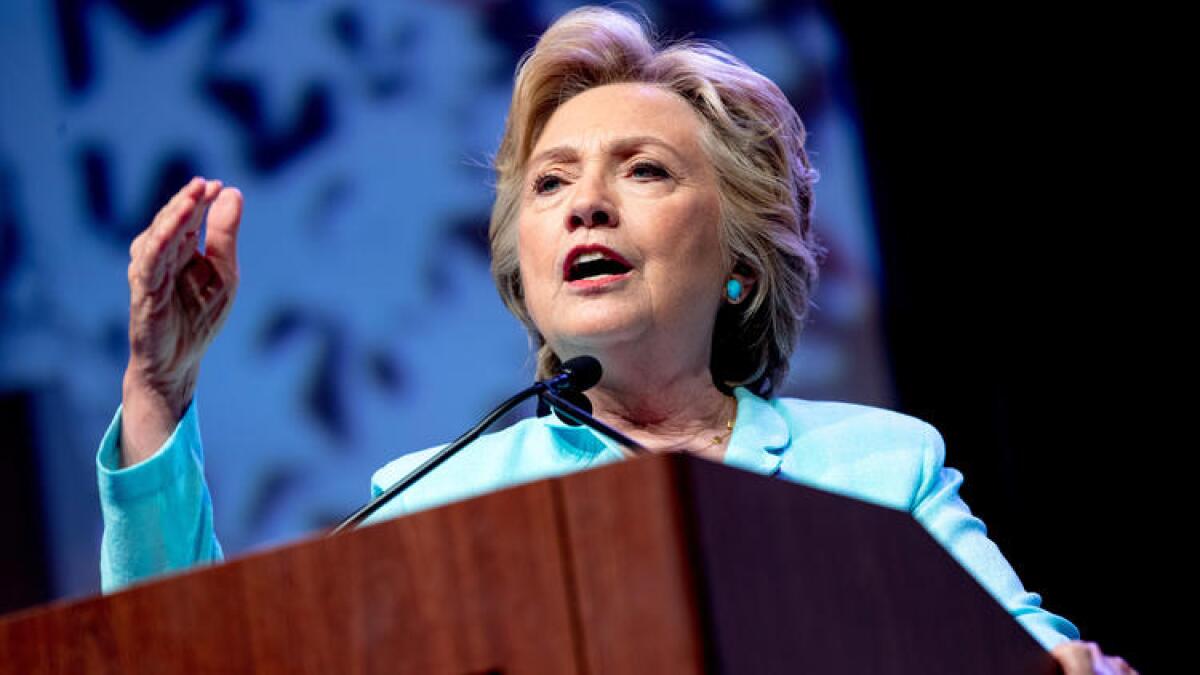
With a week until election day, Hillary Clinton’s campaign will return to the airwaves in Virginia and Colorado, while also airing its first television ads of the general election in Michigan and New Mexico.
The announcement from the Clinton campaign comes as national polls show the race between her and Donald Trump tightening. Already, nearly 25 million votes have been cast in early voting, according to an analysis by the United States Elections project, which tracks voting statistics.
Each of the four states will see a six-figure investment, according to the campaign.
In Colorado, where Clinton has not been on the air for several weeks, the campaign will run ads in the Denver, Grand Junction and Colorado Springs markets. Based on an average of several recent polls, Clinton leads Trump by about 5 percentage points there. In Virginia, ads will go up in the Richmond, Charlottesville and Roanoke markets. Clinton also holds a sizable lead in the state, outpacing Trump by about 5.3 percentage points.
In the 30-second spots, Clinton’s campaign seeks to assail Trump as unfit to lead.
“The Trump campaign claims their path to White House is through states like these, but we’re going to make sure those doors remain shut,” Jesse Ferguson, a spokesman for Clinton, said in a statement.
This week, Trump has stumped in Colorado, New Mexico and Michigan.
- Share via
Trump promises to call Congress into a special session. The last one was nearly 70 years ago
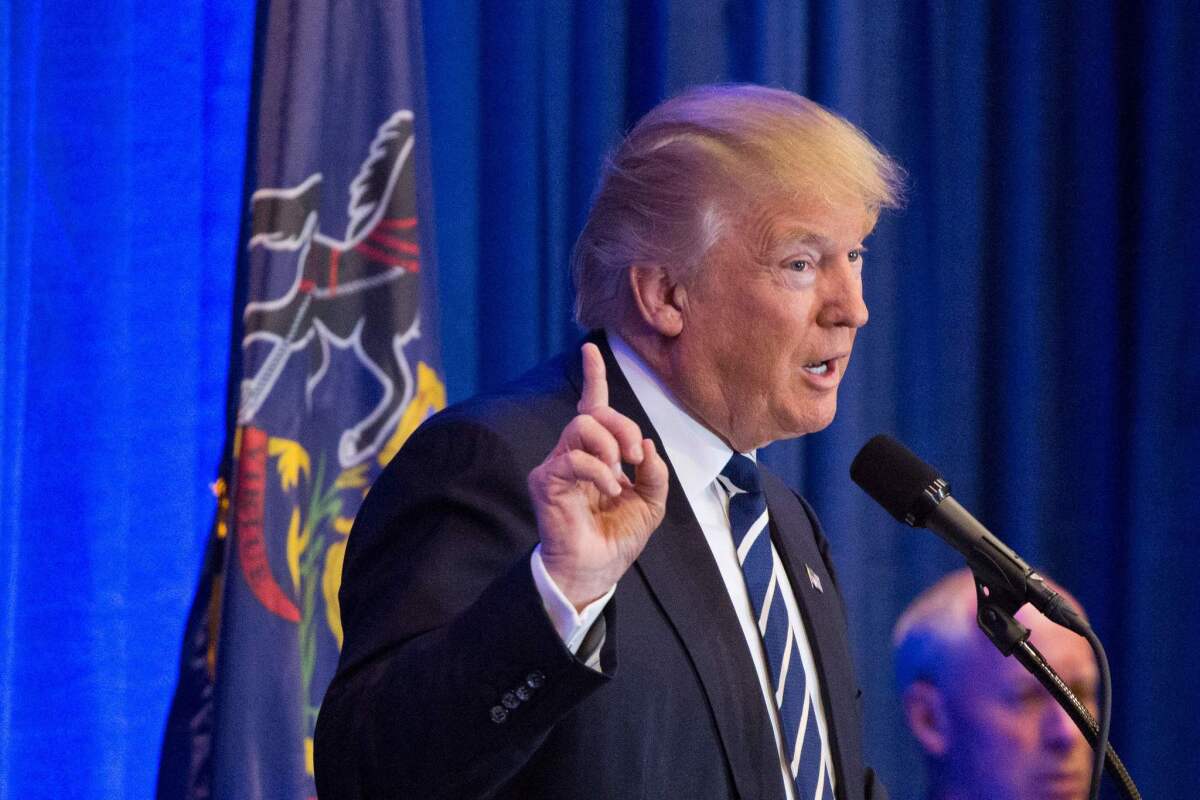
Lest there be any doubt that Donald Trump wants to nix Obamacare, he vowed on Tuesday to press for a congressional special session to repeal and replace the law.
But just exactly how Trump would follow through on the rare legislative procedure remained hazy.
During a speech in the Philadelphia suburbs dedicated to blasting the Affordable Care Act, Trump vowed, “When we win on Nov. 8 and elect a Republican Congress, we will be able to immediately repeal and replace Obamacare.”
“I will ask Congress to convene a special session so we can repeal and replace, and it will be such an honor for me, for you and for everybody in this country, because Obamacare has to be replaced,” he continued. “We will do it and we will do it very very quickly.”
The Constitution gives the president the authority “on extraordinary occasions, to convene both houses [of Congress] or either of them.”
But should Trump win, Congress would already be in session by the time he took the oath of office; lawmakers return to work on Jan. 3, while the presidential inauguration is Jan. 20. Those dates were enshrined into the Constitution with the 20th Amendment.
Since the amendment was adopted in 1933, presidents have only exercised their power to convene Congress four times. Franklin Delano Roosevelt called two special sessions — one in 1937 in a failed attempt to pass new labor regulations and another in 1939 to adopt neutrality legislation in response to the start of World War II in Europe.
His successor, Harry Truman, twice convened Congress, in 1947 and 1948, in attempts to pass domestic legislation. No president has exercised that power since.
It appears Trump is still working out the logistics of his plan. During a post-speech trip to Wawa, the gas station and food vendor with a cult following, Trump was asked whether he had spoken to congressional leaders about his desire for a special session.
Not yet, Trump replied, adding, “We will very soon.”
- Share via
Thousands of people told us what they thought of Donald Trump and Hillary Clinton. Here’s what they said
When it comes to Donald Trump and Hillary Clinton, Americans have an array of strong feelings.
Thousands of people shared their thoughts with the Los Angeles Times on the presidential candidates. Two of the most used words to describe Clinton included “liar” and “capable.” For Trump, “racist” and “strong” were at the top of the list.
Two informal surveys were posted on The Times’ website between March and August. Those for and against each candidate chimed in, as did voters who aren’t backing either.
View the full project here.
- Share via
Orange County could turn blue for the first time in 80 years
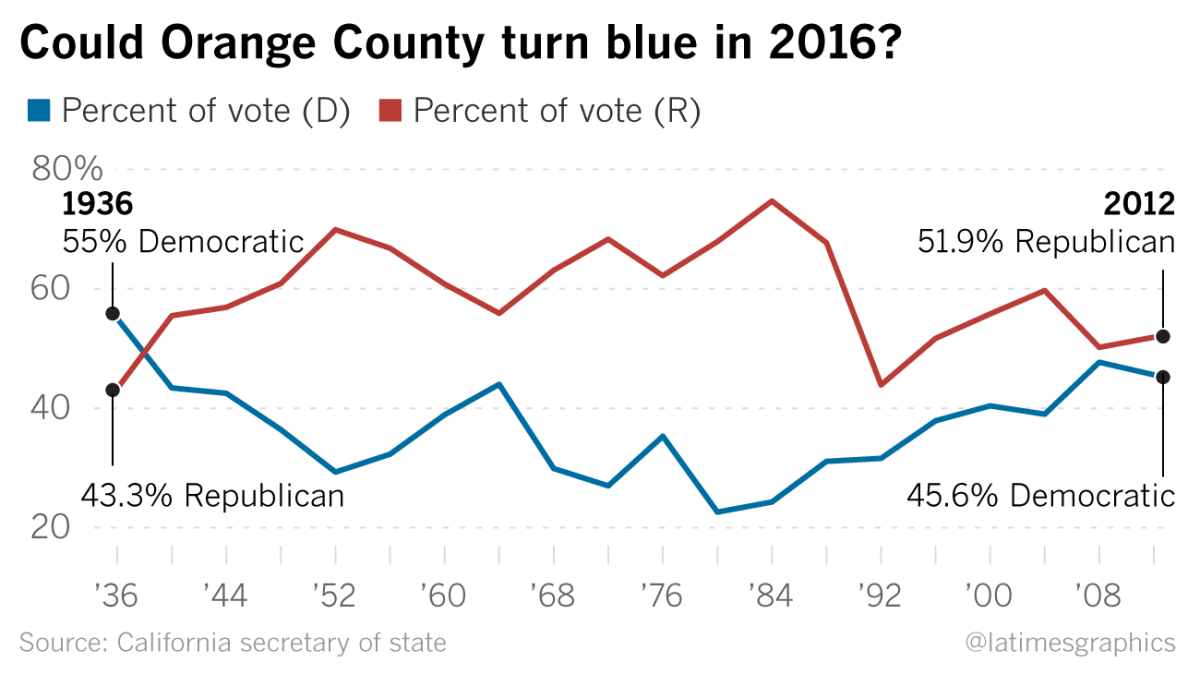
It was the home of Richard Nixon, the cradle of Ronald Reagan’s career and, for decades, a virtual synonym for the Republican Party of California.
Now, for the first time since the Depression, Orange County stands on the verge of choosing a Democrat for president, potentially ending the longest streak of Republican presidential victories of any county in the state.
That possibility symbolizes how the American political map has been upended by Donald Trump’s campaign: He has sped up a decade-long shift in which the GOP has gathered strength in white, blue-collar regions that once routinely elected Democrats, but traditional Republican suburbs increasingly have turned blue.
- Share via
That time Donald Trump got sued by a men’s rights activist
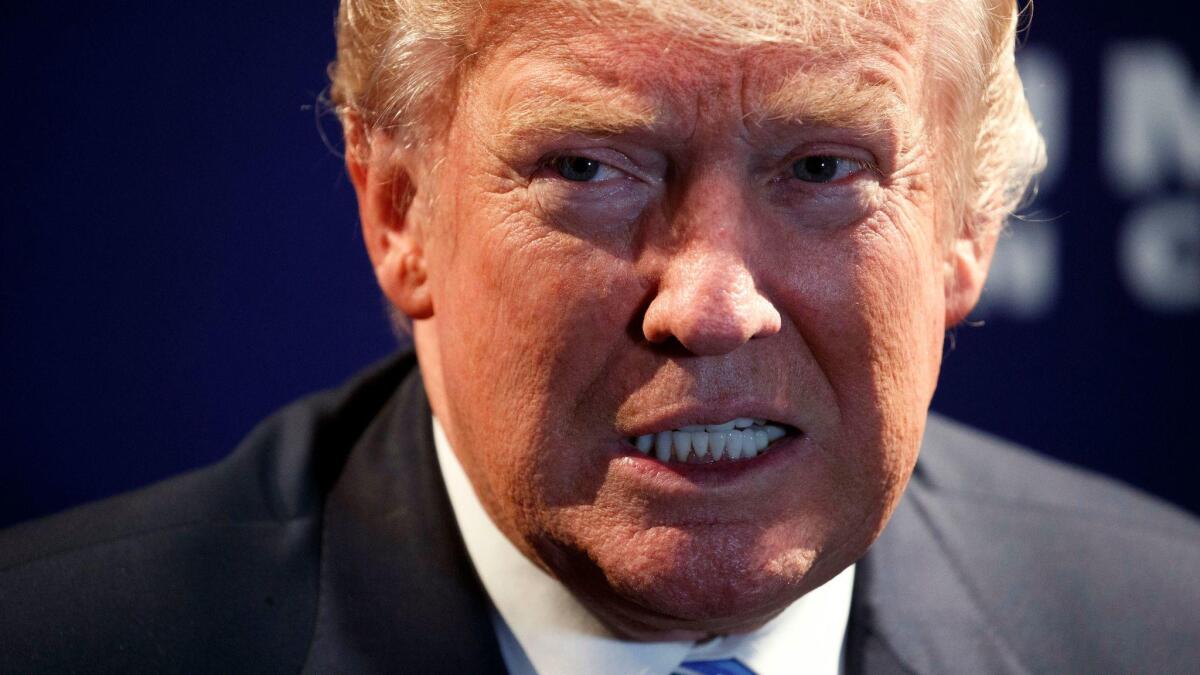
It had to be one of the most unusual lawsuits Donald Trump was ever involved with: One of his businesses in California was once accused of being sexist.
Against men.
For promoting breast cancer awareness.
- Share via
Trump warns that Obamacare will ‘destroy American healthcare forever,’ but offers few details on how he’d change it
Campaigning in the battleground state of Pennsylvania, Donald Trump and his running mate, Mike Pence, launched a new round of attacks on the Affordable Care Act on Tuesday.
“Obamacare has to be replaced, and we will do it very quickly,” Trump told supporters outside Philadelphia, promising a rare special session of Congress if he is elected. “If we don’t repeal and replace, we will destroy American healthcare forever.”
Trump again offered little detail about how he would address rising health costs beyond vague pledges to reduce regulation of health insurance. He spent just eight minutes discussing healthcare in the speech, billed as a “special” address on the topic.
But Trump’s new attacks come as state and federal officials nationwide open insurance marketplaces for 2017 enrollment amid widespread concerns about rising costs.
Federal data show premiums on these marketplaces are increasing 22% on average, driven by a combination of factors, including sicker-than-expected consumers who have cost insurers more than they anticipated.
Most marketplace shoppers will be shielded by the rate hikes because of subsidies in the health law. Consumers making less than four times the federal poverty level — about $47,000 for a single adult or $97,000 for a family of four — qualify for the aid.
“This year, the vast majority of consumers will qualify for tax credits that help keep coverage affordable, and it’s easier than ever to shop around and compare options,” Heath and Human Services Secretary Sylvia M. Burwell said as the open enrollment period began
Millions more Americans who get health coverage through an employer or a government program such as Medicare are seeing some of the slowest cost increases in history.
This year, for example, the annual family premiums for employer-sponsored health insurance rose an average of just 3%, according to an annual survey by the nonprofit Kaiser Family Foundation and the Health Research & Educational Trust.
About 150 million people get health benefits through an employer, compared with about 11 million through the marketplaces.
But several million Americans who rely on the marketplaces and make too much money to qualify for subsidies are facing large premium spikes next year.
And Pennsylvania – a state where Democrat Hillary Clinton has held a consistent lead – is seeing some of the steepest premium hikes, with an average increase of 53%, according to federal data.
In other states, including Arkansas, New Hampshire and Ohio, rates are going up just 2%.
The state rate changes between 2016 and 2017 were calculated based on the average price of the second-lowest cost silver plan for a single 27-year-old.
Rates changes for other products on the marketplaces may be higher or lower.
4:14 pm: This post has been updated to include additional background about how 2017 premium increases were calculated by the U.S. Department of Health and Human Services.
- Share via
Trump is placing a long-shot bet to win a handful of states
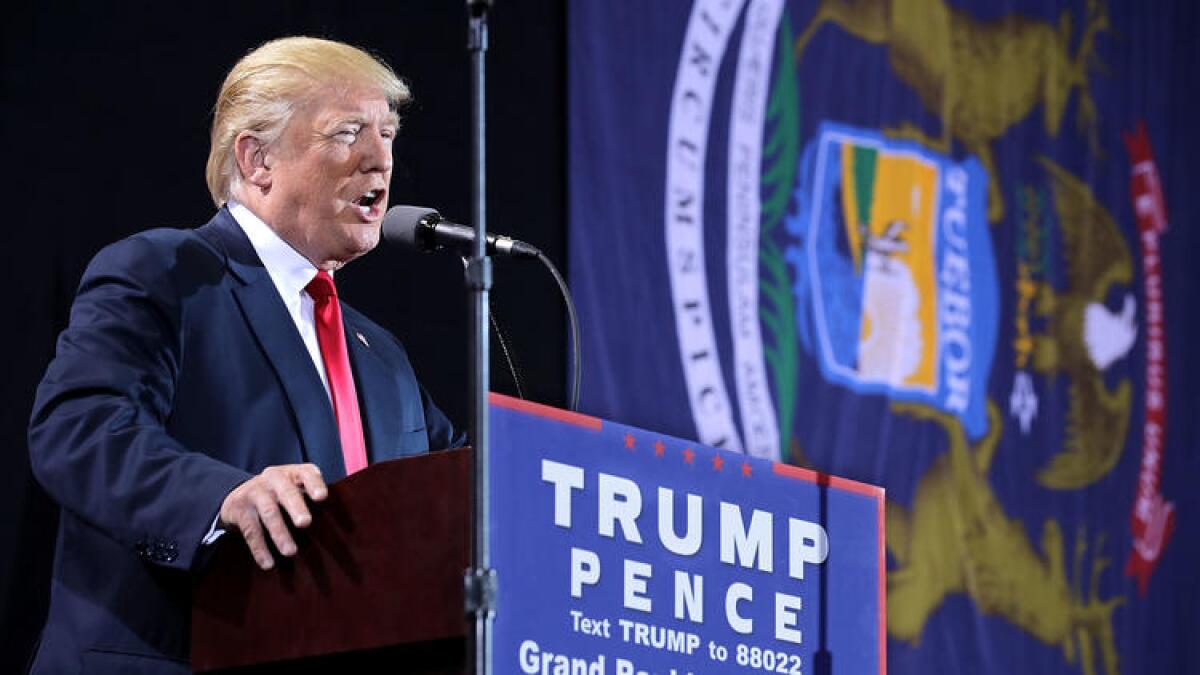
As Donald Trump kicked off the final full week before election day, he dedicated a day of campaigning in Michigan, a state that has not backed a Republican for president since 1988.
Up next, a policy speech in Pennsylvania and a rally in Wisconsin, states that also haven’t gone red since the 1980s.
As he tries to chart a path to 270 electoral votes, the GOP nominee’s schedule is marked with long-shot bids and last-ditch hopes. The risky strategy sacrifices face time in battleground states, but the gambit, if successful, would upend the political map.
- Share via
Here’s what will happen to Obama’s social media accounts when he leaves office
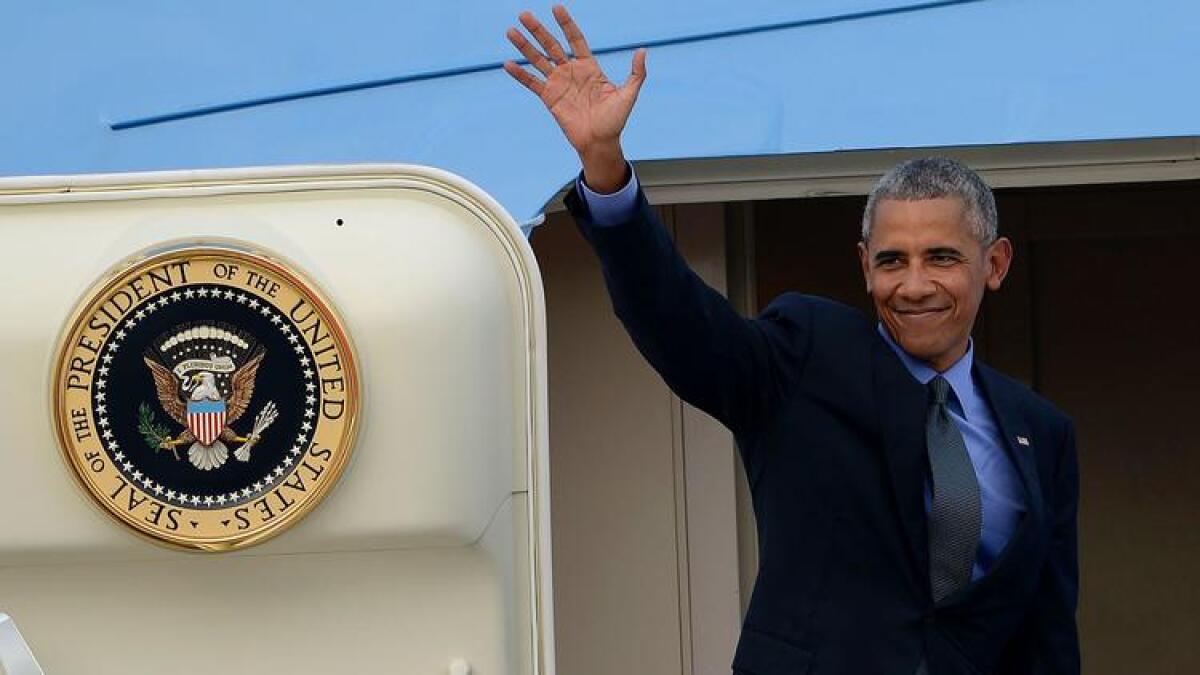
If there’s one thing we’ve learned this season, it’s that archiving of government records in the digital age can get really messy.
To avoid having that possibility hanging over the end of his time in office, President Obama has dispatched a team to make sure all his cyber records live on – including those that live on social media.
The White House’s Digital Transition plan includes an effort to preserve everything “from tweets to snaps” with the National Archives and Records Administration, just as required for more old-school communications like handwritten notes, faxes and, yes, emails.
Wherever possible, they’ll make sure social media posts remain accessible on the platforms where they were created to allow “real time access” to the content, Deputy Chief Digital Officer Kori Schulman wrote in a post on the White House website.
The content that she’s talking about includes more than 470,000 on-line petitions, some 30,000 White House tweets and thousands of hours of video footage. Obama was the first @POTUS on Twitter, the first president to go live on Facebook from the Oval Office, the first to use a filter on Snapchat. You get the picture.
Given the controversy over Hillary Clinton’s emails and the occasional firestorm over Donald Trump’s tweets, the next president might take greater care in their personal use of these types of communications.
But Obama has pioneered a new way of getting his message out directly to the American people, without going through what his early strategists referred to as the “filter” of the mainstream media. His successor, whoever that may be, is likely to note his success.
Obama’s digital team sees their transition plan for social media as part of the great American tradition of turning over the keys to the White House without a fight.
“While much of the digital transition is unprecedented in the United States, the peaceful transition of power is not,” Schulman wrote. “There are some important principles we can work from.”
One of the priorities is to make sure the next president and administration can keep on using the White House’s digital assets.
So the @POTUS Twitter handle will be available to the 45th president starting on inauguration day. The new @POTUS will inherit Obama’s 11 million followers, but begin day one with no tweets on the timeline. The old content will all be archived. Likewise with Instagram and Facebook, the plan says.
Both the Clinton and Trump campaigns have transition teams in place that have been told about the White House plan. Clinton says she is personally “superstitious” about planning for the presidency, but her transition team is working on the particulars already. Trump’s designee reportedly missed the last transition meeting with the White House, but aides involved say they are still thinking about it.
Meantime, Obama has miles to go before he last tweets.
- Share via
In Florida, Clinton returns focus to Trump’s treatment of women
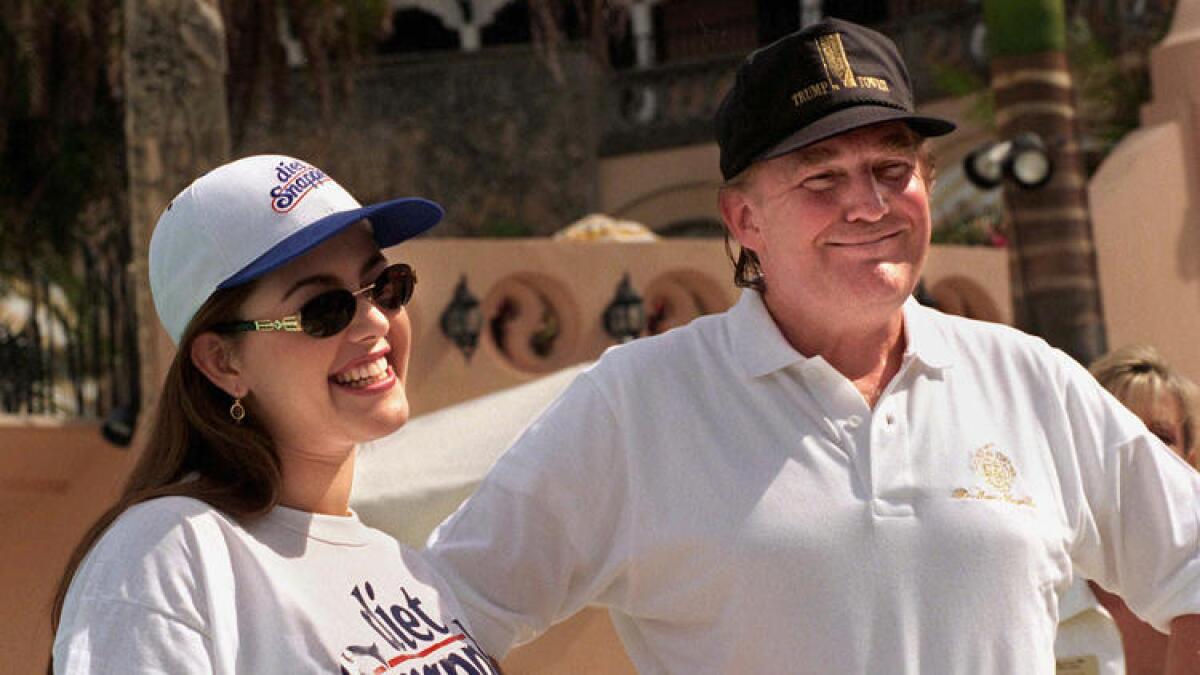
As her campaign continues to play defense over the renewed FBI scrutiny of emails connected to her private server, Hillary Clinton is again looking to play offense against Donald Trump, with her focus Tuesday on her rival’s attitude toward and treatment of women.
At one of three events scheduled in Florida, Clinton will be introduced by Alicia Machado, the former Miss Universe who was the target of scorn and ridicule by Trump for weight gain after she won her crown. The event in Dade City precedes stops in Sanford and Fort Lauderdale, her second trip to Florida in three days.
Separately, Clinton’s campaign is launching a new 60-second ad that is something of a greatest, or worst, hits of Trump’s comments on women, including his infamous boast aboard an “Access Hollywood” bus about grabbing women’s genitals. It also shows news reports of recent assault claims against Trump. A message on screen says that anyone who does these things “is unfit to be president.”
The Clinton campaign says this is part of its closing argument to voters about the danger Trump would pose as president. It comes a day after Clinton warned about whether Trump had the steadiness to serve as commander-in-chief and gain control of the nation’s nuclear arsenal.
It’s a more negative turn by the Democrat than what she had signaled just a week earlier she hoped to focus on: her affirmative vision for the country based on her lifetime of work for women and families. But Monday night Clinton signaled the turn, saying that while she preferred that voters were “motivated by what we’re for and not what we’re against,” it was “prudent” to illuminate the contrast with her opponent.
- Share via
‘Deja vu’ on Clinton scandals, House Speaker Paul D. Ryan says, adding he voted for Trump
House Speaker Paul D. Ryan says the FBI investigation into Democratic presidential nominee Hillary Clinton’s emails is a sign of things to come if she’s elected.
“This is what life with the Clintons looks like. It’s always a scandal, one after another,” he said on Fox and Friends Tuesday morning.
Ryan said he would not campaign on Trump’s behalf after video of a 2005 conversation the nominee had about groping women became public. He reiterated that stance Tuesday, but said that he voted for “our nominee” last week during early voting in Wisconsin.
- Share via
Who did John Kasich vote for? Not Trump
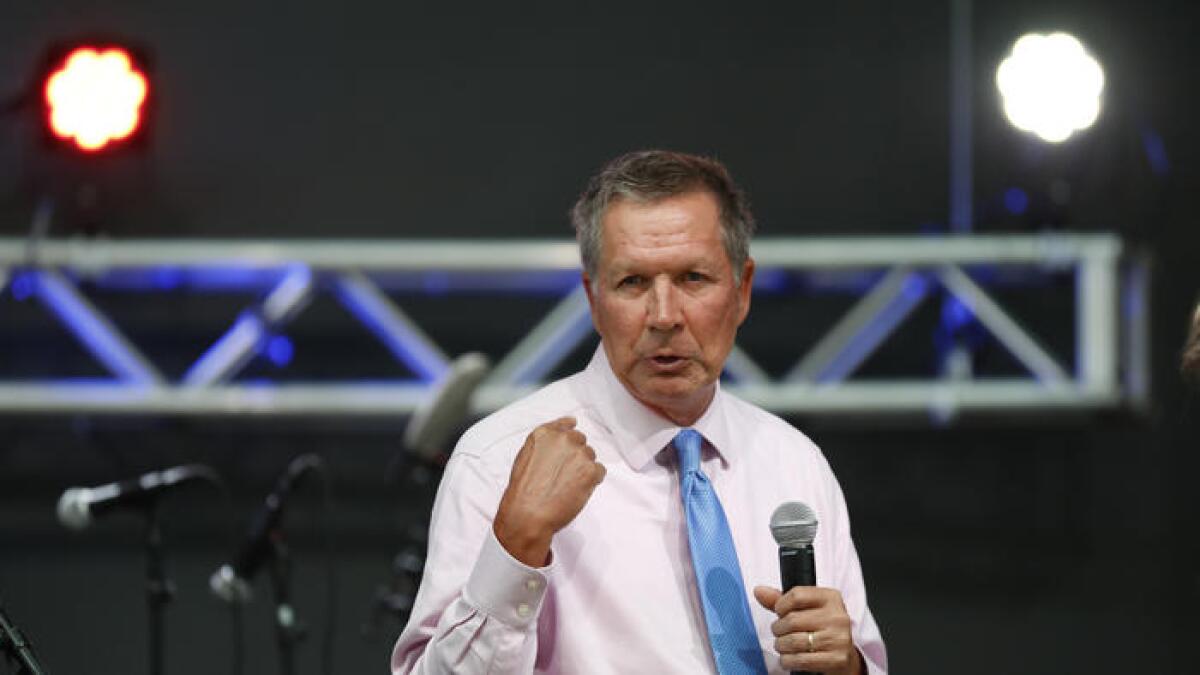
John Kasich kept his promise.
The Ohio governor wrote in Sen. John McCain (R-Ariz.) for president after vowing not to vote for Donald Trump, Kasich’s political spokesman Chris Schrimpf told Cleveland.com.
“Donald Trump is a man I cannot and should not support,” Kasich said this month after video of the candidate speaking lewdly about women surfaced.
McCain, the 2008 Republican presidential nominee, is not one of the 18 viable write-in candidates in Ohio. So Kasich’s choice symbolizes a defiance of his party, but doesn’t alter the political race.
The governor voted all Republican on the remainder of his ballot, Schrimpf said.
- Share via
Trump calls Clinton ‘unfit’ in morning tweet
- Share via
FBI speeds up its investigation into possible Clinton-related emails after criticism
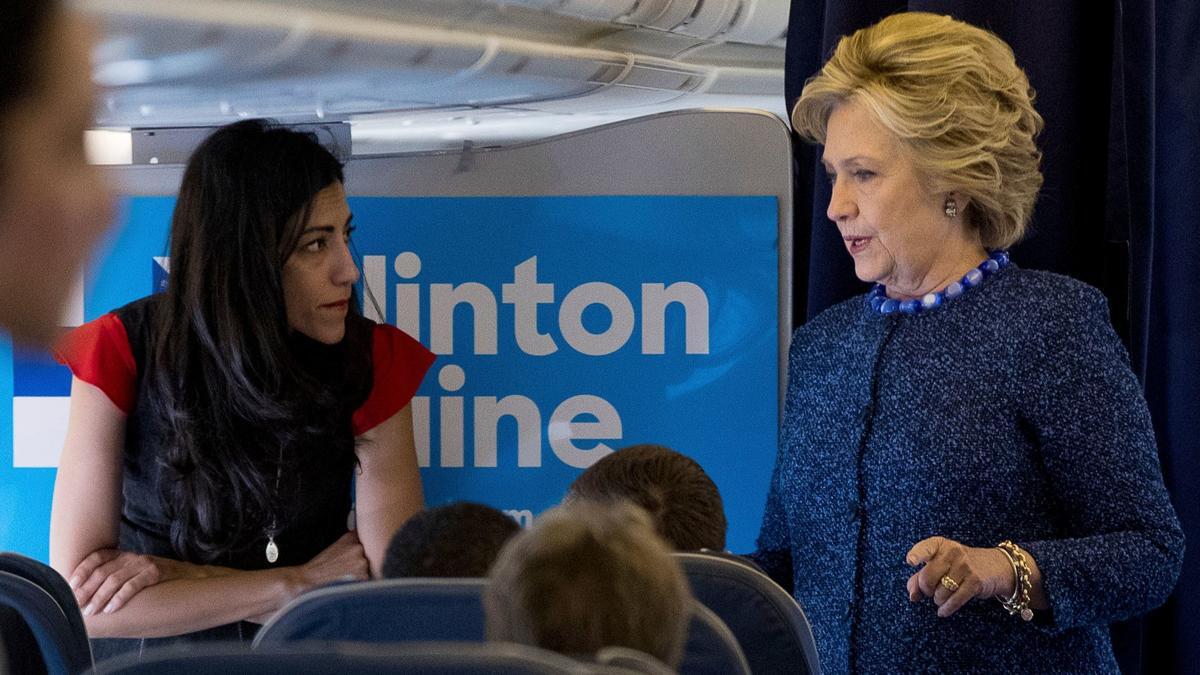
The FBI accelerated its timeline for reviewing emails potentially linked to Hillary Clinton on Monday amid growing public pressure over the agency’s surprise announcement that it had found them in an unrelated case.
Investigators had planned to conduct the review over several weeks but, after a torrent of criticism over the weekend, began scrambling to examine the trove of emails, according to law enforcement officials. The FBI hoped to complete a preliminary assessment in the coming days, but agency officials have not decided how, or whether, they will disclose the results of it publicly, and officials also could not say whether the entire review would be completed by election day.
The uncertainty did not stop Donald Trump from charging into the vacuum with ominous speculation that a Clinton victory would spark national upheaval. Clinton repeated that she was confident the FBI had no case against her and that voters had already made up their minds on her use of a private server while she was secretary of State.
- Share via
Peter Thiel explains why he’s backing Donald Trump: Voters are desperate for an outsider
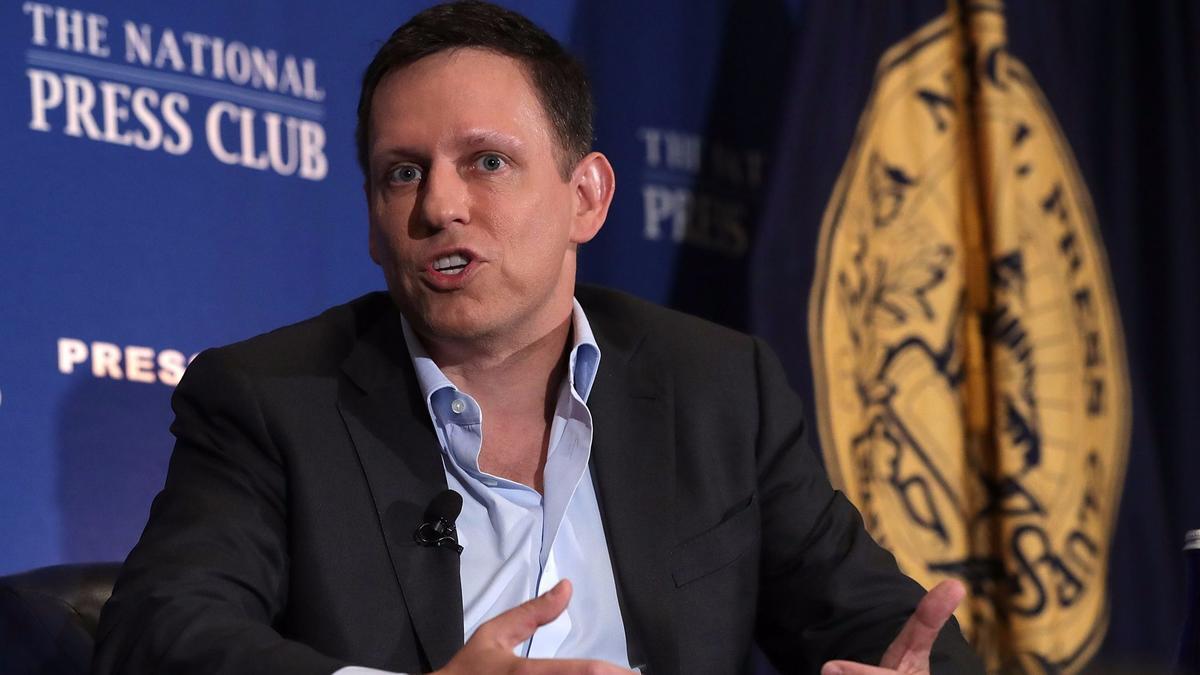
The tech billionaire who is one of the most powerful men in Silicon Valley sounded almost naive as he sat before a roomful of reporters on Monday in the nation’s capital to explain his $1.25-million donation to help elect Donald Trump.
“I didn’t think as much about the donation as much as I should have,” Peter Thiel said in his halting voice that makes every phrase sound thought out. “I didn’t even think that Trump needed my money.”
Thiel has thought a lot about the donation since it became public in early October, facing down widespread rejection in Silicon Valley, including an effort to oust him from the board of Facebook, a company in which he was an early investor.